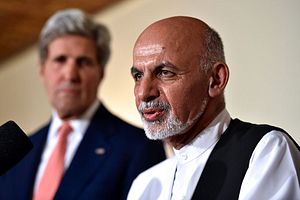On Monday, Pakistan will host top officials from Afghanistan, the United States, and China to discuss an upcoming resumption of peace talks between the Afghan national unity government in Kabul and the leadership of the Taliban. The talks will resume after they collapsed last summer, leading to a fall and winter of increased fighting between the government and the insurgents. The United States and China—both allies of Pakistan—supported and witnessed the last round of talks also. Islamabad hosted the last round of talks as well.
Pakistan’s role as host is significant since its military is seen to exercise considerable influence with the leadership of the Taliban. Monday’s meeting comes shortly after reports suggested that Pakistan would present the Afghan government with a list of Taliban willing to reenter negotiations. According to a spokesperson for Afghan Chief Executive Abdullah Abdullah’s office who spoke to Khaama News, Pakistan has also agreed to cease financial support to Taliban fighters based in Quetta and Peshawar—two Pakistani cities known to be favored by the Taliban leadership.
As I discussed at the end of 2015, the current groundwork for resuming peace talks comes after an attempt by both Kabul and Islamabad to pick up the pieces of a failed attempt at bilateral rapprochement between their governments last summer. Beginning with the multilateral Heart of Asia/Istanbul Process meeting in early December 2015, the two countries have resumed high-level channels to communicate on the issue of peace talks, which have acquired a new urgency for Kabul after the Taliban’s many battlefield successes in late-2015 (most notably, their successful September siege of Kunduz).
Pakistan’s powerful chief of army staff, General Raheel Sharif, visited Kabul at the end of the year as well. Sharif’s visit came just over a month after he’d visited Washington, where the security situation in Afghanistan was high on the agenda in his various talks with senior U.S. officials. Despite the fragile bilateral between Kabul and Islamabad picking up in the last few months of 2015, U.S. officials appear less-than-sanguine about the prospects of successful peace talks.
According to David Hale, the U.S. ambassador to Pakistan, including Pakistan, the United States, and China in this process is important because these states “all have ways in which they can influence positively this outcome.” Hale told Voice of America that the goal is to still ensure that this process is “Afghan-led [and] Afghan-owned.” “Now the even harder part starts of actually getting going, and we are in that sort of preparatory phase now of having discussions behind the scenes on just how we get organized and develop a strategy here to bring it home,” he adds.
Afghan President Ashraf Ghani remains optimistic that this round of multilateral talks will be successful and that peace talks, if resumed, can be promising. Referring to Pakistan, Ghani noted that “this time we have received assurances that force and other means will be used against non-reconcilable” fighters.

































